|
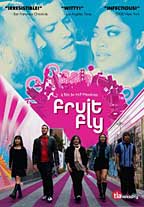
Fruit
Fly
TLA
Releasing,
2009
Director/Screenplay:
H.P. Mendoza
Starring:
L.A. Renigen,
Mike Curtis
Theresa Navarro, Aaron Zaragoza, E.S. Park, Christian Cagigal, Don Wood,
Michelle Talgarow, Christina Augello
Unrated,
94 min
|
Monologue
Art
by
Michael D. Klemm
A shorter version also appeared on abOUTmag.com,
October, 2010
Posted online October, 2010
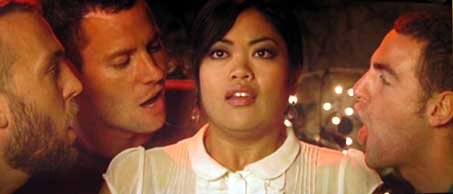
Oh,
the joys of reviewing low budget independent films. Take 2009's Fruit
Fly, an offbeat musical written, directed and scored by
H.P. Mendoza (Colma: The Musical). I wanted to love this movie,
I really did. But films like this, which can be awesome one minute and
awful the next, present special challenges and they're the hardest to
write about. Yes, parts of Fruit Fly
are quite clumsy but there are charms in spite of its limitations to tame
the savage critic. And some of the tunes are toe tappers.
|
|
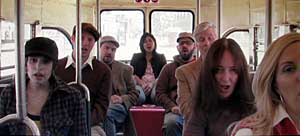 L.A.
Renigen stars as Bethesda, a Filipina performance artist. She has moved
to San Francisco to find fame and to perhaps also find her biological
mother in the process. She moves into a communal home populated by assorted
artists. Tracy, the landlord, often offers his opinions on art and annoys
everyone by saying that monologues (and performance art) are simply opportunities
for an artist to masturbate in public without feeling guilty about it.
"I won't be here long." Bethesda sings, as do each of the other tenants
when we meet them one by one throughout this establishing scene. L.A.
Renigen stars as Bethesda, a Filipina performance artist. She has moved
to San Francisco to find fame and to perhaps also find her biological
mother in the process. She moves into a communal home populated by assorted
artists. Tracy, the landlord, often offers his opinions on art and annoys
everyone by saying that monologues (and performance art) are simply opportunities
for an artist to masturbate in public without feeling guilty about it.
"I won't be here long." Bethesda sings, as do each of the other tenants
when we meet them one by one throughout this establishing scene.
|
|
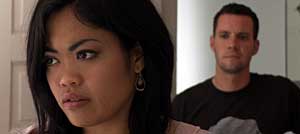 Bethesda
is looking for a space to perform her monologue/dance piece about being
adopted and searching for her birth mother. Jacob, a 17 year old runaway
is trying to put together a monologue about... something; he doesn't know
what yet. Sharon and Karen share both art and a bed. Bethesda has a couple
performance movies on Youtube. She laments that her videos had only 14
hits in the last year and then discovers that Sharon, an aspiring actress,
is her biggest fan and one of those 14 hits. Windham (Mike Curtis) is
a gay lighting and set designer whose shows always happen to have naked
men in them. He becomes Bethesda's best friend - and she becomes his fag
hag. We know this is her designated title because Windham and his friends
break into a song called "You're A Fag Hag" and sing it to her in a gay
bar that night. Bethesda
is looking for a space to perform her monologue/dance piece about being
adopted and searching for her birth mother. Jacob, a 17 year old runaway
is trying to put together a monologue about... something; he doesn't know
what yet. Sharon and Karen share both art and a bed. Bethesda has a couple
performance movies on Youtube. She laments that her videos had only 14
hits in the last year and then discovers that Sharon, an aspiring actress,
is her biggest fan and one of those 14 hits. Windham (Mike Curtis) is
a gay lighting and set designer whose shows always happen to have naked
men in them. He becomes Bethesda's best friend - and she becomes his fag
hag. We know this is her designated title because Windham and his friends
break into a song called "You're A Fag Hag" and sing it to her in a gay
bar that night.
|
|
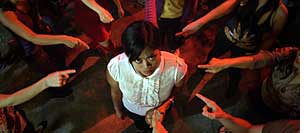 This
song is one of the film's highlights. The musical numbers are what most
people will watch Fruit Fly
for, and they are a mixed bag to say the least. But when the scenes work,
they do work. The "Fag Hag" song, for starters, is one of the best
sung in the film. The lyrics are witty and funny. The choreography is
simple, almost primitive, but it works. The director also makes good use
of the widescreen Cinemascope frame. Okay, it's not a Jerome Robbins number
from West Side Story but "less-is-more" is sometimes the way to
go. This
song is one of the film's highlights. The musical numbers are what most
people will watch Fruit Fly
for, and they are a mixed bag to say the least. But when the scenes work,
they do work. The "Fag Hag" song, for starters, is one of the best
sung in the film. The lyrics are witty and funny. The choreography is
simple, almost primitive, but it works. The director also makes good use
of the widescreen Cinemascope frame. Okay, it's not a Jerome Robbins number
from West Side Story but "less-is-more" is sometimes the way to
go.
|
|
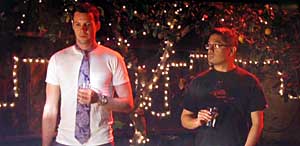 The
best numbers are tongue-in-cheek. Take the hilarious duet sung by Windham
and his blind date, Mark (the film's director, Mendoza). The anxiety-ridden
lyrics convey how they fear having nothing in common but that all changes
when each proclaims that he is a "versatile bottom." This one had me laughing
out loud. Brilliant. Ditto for another that is sung during a disastrous
date. Bethesda goes to dinner with Gaz Howard (Christian Cagigal), San
Francisco's most prolific performance artist. He sings unceasingly about
his monologues, ending each verse with the refrain "Enough about
me." And then, before she can open her mouth, he is singing about himself
again. The
best numbers are tongue-in-cheek. Take the hilarious duet sung by Windham
and his blind date, Mark (the film's director, Mendoza). The anxiety-ridden
lyrics convey how they fear having nothing in common but that all changes
when each proclaims that he is a "versatile bottom." This one had me laughing
out loud. Brilliant. Ditto for another that is sung during a disastrous
date. Bethesda goes to dinner with Gaz Howard (Christian Cagigal), San
Francisco's most prolific performance artist. He sings unceasingly about
his monologues, ending each verse with the refrain "Enough about
me." And then, before she can open her mouth, he is singing about himself
again.
|
|
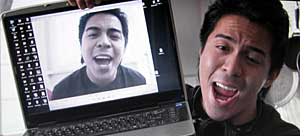 Other
numbers are less successful. The opening song, filmed on subways and buses,
extols the virtues of public transport. The chorus of passengers is cute
but most of the lyrics are unintelligible. A few of the solo songs are
really flat and grind the film to a halt. One of them is supposed to be
angry but, instead, sounds like the singer is on valium - hardly Adam
Pascal singing "One Song Glory" in the original cast recording of Rent.
The song's finale is rather cool though when he duets with himself on
a laptop. The annoying music during the opening credits sounds like it
is being performed on a child's cheap Casio synthesizer. Other
numbers are less successful. The opening song, filmed on subways and buses,
extols the virtues of public transport. The chorus of passengers is cute
but most of the lyrics are unintelligible. A few of the solo songs are
really flat and grind the film to a halt. One of them is supposed to be
angry but, instead, sounds like the singer is on valium - hardly Adam
Pascal singing "One Song Glory" in the original cast recording of Rent.
The song's finale is rather cool though when he duets with himself on
a laptop. The annoying music during the opening credits sounds like it
is being performed on a child's cheap Casio synthesizer.
|
|
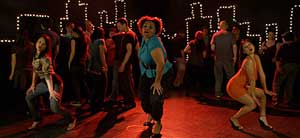 Fruit
Fly
is one of those films that you have a really bad feeling about when it
starts. (Again, that bad synthesizer music.) Then you get kinda caught
up in its quirky primitivism. The middle section of the movie becomes
quite entertaining. But then it becomes apparent that the auteur had no
idea where to go for the last act and so narrative is dispensed with in
favor of more musical numbers. Thankfully, the last songs are good (including
a finale in which they sing that their lives are "works in progress").
I've written before on many occasions that I prefer it when films don't
have everything wrapped up in a red ribbon, but nothing is resolved
at the end of Fruit Fly. Fruit
Fly
is one of those films that you have a really bad feeling about when it
starts. (Again, that bad synthesizer music.) Then you get kinda caught
up in its quirky primitivism. The middle section of the movie becomes
quite entertaining. But then it becomes apparent that the auteur had no
idea where to go for the last act and so narrative is dispensed with in
favor of more musical numbers. Thankfully, the last songs are good (including
a finale in which they sing that their lives are "works in progress").
I've written before on many occasions that I prefer it when films don't
have everything wrapped up in a red ribbon, but nothing is resolved
at the end of Fruit Fly.
|
|
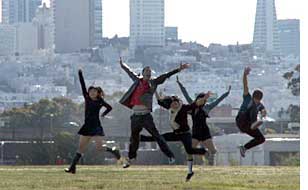 Without
hitting the audience over the head, Mendoza explores racism and stereotypes
- both the deliberate and the unintentional. A white gay man tells Bethesda,
for no apparent reasons other than her being Asian, that she's just like
Margaret Cho - this can either be taken
as compliment or condescension. Bethesda takes great offense to being
called a fag hag (the "hag" part is what really bothers her). But, when
a chorus of fellow Fag Hags revel in their identity, is the term a pejorative
or does it describe an exclusive club? It's telling that the "Fag Hag"
song sounds a lot like "Colored Spade" from the late 60s musical Hair;
another song that mocked racial epithets. The director states in a press
release that the Castro is still a "white boys club" and so he wanted
to address this in the film. It is refreshing, here, to see a nice racial
mix. It is still uncommon to see Asians as leads in American cinema and
Fruit Fly features three oriental
women. Without
hitting the audience over the head, Mendoza explores racism and stereotypes
- both the deliberate and the unintentional. A white gay man tells Bethesda,
for no apparent reasons other than her being Asian, that she's just like
Margaret Cho - this can either be taken
as compliment or condescension. Bethesda takes great offense to being
called a fag hag (the "hag" part is what really bothers her). But, when
a chorus of fellow Fag Hags revel in their identity, is the term a pejorative
or does it describe an exclusive club? It's telling that the "Fag Hag"
song sounds a lot like "Colored Spade" from the late 60s musical Hair;
another song that mocked racial epithets. The director states in a press
release that the Castro is still a "white boys club" and so he wanted
to address this in the film. It is refreshing, here, to see a nice racial
mix. It is still uncommon to see Asians as leads in American cinema and
Fruit Fly features three oriental
women.
|
|
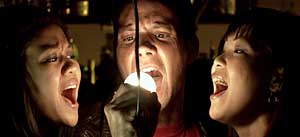 On
the whole, the film could use a trip back to the editing room but it gets
many things right. The director nails the camaraderie (and rivalries)
between the artists and there's a natural quality to a lot of their scenes.
The acting is a mixed bag and it is unfortunate that a couple of the performances
are a tad on the stilted side. Still, Mendoza works around most of these
limitations. The widescreen cinematography is usually vibrant and colorful.
Attention is paid to the visuals. There is cute animation of a lit up
cityscape whose skyscrapers flash like a stereo's equalizer. Later the
same cityscape turns into a game of Tetris as pieces fall into gaps between
the buildings. On
the whole, the film could use a trip back to the editing room but it gets
many things right. The director nails the camaraderie (and rivalries)
between the artists and there's a natural quality to a lot of their scenes.
The acting is a mixed bag and it is unfortunate that a couple of the performances
are a tad on the stilted side. Still, Mendoza works around most of these
limitations. The widescreen cinematography is usually vibrant and colorful.
Attention is paid to the visuals. There is cute animation of a lit up
cityscape whose skyscrapers flash like a stereo's equalizer. Later the
same cityscape turns into a game of Tetris as pieces fall into gaps between
the buildings.
So...
while I may not love this movie, there was certainly a lot about
it that I liked. Most of it is fun and I am never going to forget that
"Versatile Bottom" song. Fruit Fly
isn't quite as polished as two other recent gay songfests, Were
The World Mine and The Big Gay
Musical, but it deserves an audience. Check it out.
|

